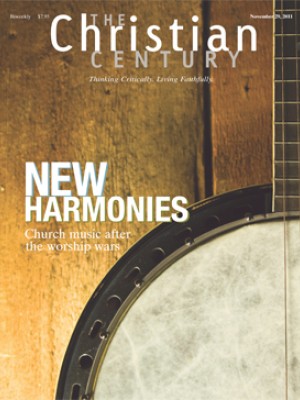Sunday, December 4, 2011: Isaiah 40:1–11; Mark 1:1–8
I'm afraid I want the good news of Christmas without the challenge.
I saw Danny this week. He was walking down Church Street in downtown New Haven, pretending he had somewhere to go. I knew better. Luckily I saw him in time and could slow my pace so that he didn't catch my eye. I didn't want to hear it from him again. Not yet.
Danny appeared on our porch on a cold December afternoon a couple of years ago, hat in hand. He was honest, at least. He'd been sleeping here and there since getting back into town, he said, mostly on the porch of the Red Cross headquarters across from the church. The people there didn't seem to mind, and he always cleared out before anyone arrived for work in the morning. He didn't want anyone to be frightened.
Read our latest issue or browse back issues.
He needed some food, maybe some money for the bus. We'd just hung the Moravian Christmas star on our front porch and placed Advent candles in our windows. It was a pretty tough moment to refuse someone aid, so against my better judgment I dug into my wallet and found a few dollars. As he was leaving, Danny turned and looked me in the eye.
"Is this the way it's supposed to be?" he asked.
He was off before I could reply or even register what he'd said. He came back with one need or another throughout the winter and over the years that followed. Sometimes I'd give him some money or make a call to find him a place to live, but nothing seemed to work out for very long. I'd see him working downtown, selling newspapers in front of Bruegger's Bagels or washing windows on Chapel Street.
"Good morning, Reverend," he'd call out. His greeting would almost always be followed with his one-line sermon. "Reverend, is this the way it's supposed to be?"
I'd nod, as if Danny were doing just the right thing, working for a couple of dollars that were not just a handout. But he was asking much more than that, whether he knew it or not. The question still haunts me. Is creation in perfect order? Is the society supposed to abide some people living on the margins? Is it OK that some are so poor that they must beg while others walk briskly off to their shining offices? Those were questions I didn't want to engage.
I don't like Danny. I don't like the kind of relationship we have, built as it is on his need and my reluctant response. I don't like his appearing at my door or at a coffee shop at times when I don't expect to see him. And I don't like the one-line sermon that he insists on delivering, especially in Advent, when that odd character John appears in the wilderness. John too has a one-line sermon, right out of Isaiah.
"Is this the way it's supposed to be?" he cries. "Prepare the way of the Lord. Make God's paths straight!"
People look at him as if he's crazy. They offer him some bread to go with his wild honey. They give him money for a bus ticket, hoping that he'll land a real job. They, like us, would prefer simply to hear about wonderful Jesus.
"Tell us stories of a young family on a long journey," they ask. "Talk to us about the child soon to be born in a stable built for animals."
"You are not ready for that story," John insists. "Remember Isaiah. Every valley will be lifted up. There will be equity for the meek, justice for the poor. Then the glory of the Lord shall be revealed."
I don't know about you, but I stand back from such fantasy. I slow my pace and let it pass by without catching my eye, because even daring to imagine a new creation where the powerful are brought low and the meek made powerful—a world where everything that we know about the natural order is placed on its head—seems terribly dangerous to me. Daring to hope for such a new creation requires the sort of self-reflection on this creation and on my life that I'm not anxious to endure.
In other words, I want the good news of Christmas without the challenge. I want the birth narrative without the prophet. I want redemption without judgment.
Danny, whom I expect to see on my front porch any day now, probably knocks on lots of doors and engages in lots of conversations with strangers. I wonder if he reserves his theological challenge, "Is this the way things are supposed to be?" for me, the reverend, and for others he knows to be church- people. John the Baptist wanted most of all to reach religious folks, wanted people like us to stop resisting God's judgment and sovereignty.
In the popular culture, Christmas arrives just after Halloween. The babe is lying peacefully in a plastic manger, and the songs of angel choirs are well amplified throughout the shopping complexes.
But none of that is our concern, these prophets insist, because God comes. God comes in the cries of the prophets of old and in street corner characters of our day, telling us that before the fullness of the kingdom of God can be made known, the rough places must be made plain, the way must be made clear and God's judgment must be endured. Only then will God's peace and God's justice fill the earth. Only then will the shepherd gather the flock. That will be the way that it's supposed to be.






